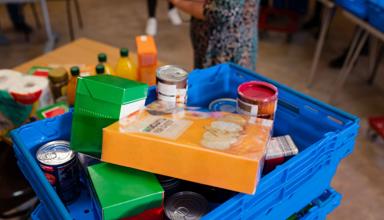Living in poverty affects children’s life chances, educational attainment, health and future work prospects.
Consequently, reducing child poverty has been a long-standing objective of Welsh governments However, while child poverty rates fell in the early years of devolution, they have since fluctuated.
Our September 2023 article set out the latest child poverty data, and detailed the Welsh Government’s approach to tackling child poverty. Ahead of the Plenary debate on the Equality and Social Justice (ESJ) Committee’s report on 10 January, this article explores the effectiveness of the Welsh Government’s approach.
A lack of ambition?
The Minister for Social Justice, Jane Hutt MS, says the Welsh Government is “committed to tackling child poverty as an absolute priority”. It published its draft child poverty strategy for consultation last year, and will publish its final strategy early this year.
In her foreword to the draft strategy, the Minister for Social Justice highlighted the impact of UK Government policies, such as austerity and welfare reforms, on the Welsh Government’s ability to tackle child poverty. She said:
In these circumstances, while the efforts of the Welsh Government can mitigate, or slow down, the impact of UK decisions, they cannot reverse the tide which flows so powerfully and deliberately in the opposite direction.
However, Chris Birt of the Joseph Rowntree Foundation countered that, while UK Government decisions clearly have an impact, there are also plenty of child poverty reduction measures within the Welsh Government’s powers:
…if we think that there is nothing that the Welsh Government or Senedd can do to reduce poverty in Wales, I’d pack up. Of course there are things to do.
The ESJ Committee heard widespread concerns that the Welsh Government’s approach lacks ambition. The Children’s Commissioner suggests the Welsh Government does not have faith in its ability to deliver the aspirations in its draft strategy, and is “focusing more on what we can't do and why”. Similarly, the Bevan Foundation urges the Welsh Government to be “much more ambitious”, focussing on contributing to eradicating child poverty.
Are targets needed to focus efforts?
The Welsh Government’s draft strategy doesn’t include child poverty reduction targets. Instead, the Welsh Government proposes using a range of other indicators to measure progress in tackling child poverty.
However, a wide range of organisations, including Audit Wales, the Children’s Commissioner, and the Equality and Human Rights Commission have called for the Welsh Government to set specific child poverty reduction targets.
Scotland set child poverty reduction targets through the Child Poverty Act (Scotland) 2017. The Poverty and Inequality Commission, which independently advises Scottish Ministers, says that while targets should not be the sole focus:
…child poverty targets are extremely important because they concentrate minds and resources. They provide a high level measure of child poverty that focuses on addressing low income. This requires government to take large-scale action, rather than working in the margins on small-scale projects.
The ESJ Committee believes it’s “essential that challenging but realistic interim and longer-term targets are included in the child poverty strategy” to provide accountability for delivering progress. However, the Welsh Government considers that using a range of indicators will “more accurately reflect progress against our approach to this complex set of problems than a purely target-based measure”.
A clear vision for tackling child poverty, or a list of existing policies?
The Children’s Commissioner describes the draft strategy as a list of existing policies that “doesn't really spell out exactly what, how, when or who will actually deliver against those different policies”. Similarly, the Observatory on Human Rights of Children has expressed concern that the Welsh Government’s approach:
…does not articulate a clear strategic framework to identify, prioritise, plan and implement actions, allocate resources, develop outcome targets, or monitor progress and promote accountability for interventions to tackle child poverty in Wales, now and in the future.
The ESJ Committee concluded that “the lack of ambition and targets” within the draft strategy has led to a lack of coherence and co-ordination in the Welsh Government’s approach to tackling child poverty. It called for a dedicated Minister for Babies, Children and Young People to co-ordinate efforts to tackle child poverty.
Reducing child poverty - what works?
In a report for the Wales Centre for Public Policy, Dr Irene Bucelli and Dr Abigail McKnight highlight the policies international evidence shows are most effective at reducing poverty. These include social protection policies; active labour market programmes; free or reduced-cost school meals; better quality early years education and childcare; and improving financial literacy. Evidence from Scotland and New Zealand suggests these initiatives require long-term investment in order to be successful.
The Bevan Foundation says that income-related measures are proven to work, and should be the main focus of a child poverty reduction strategy. While key social security levers remain at Westminster, the Welsh Government delivers means-tested grants known as the ‘Welsh benefits system’. The Welsh Government says it is working to make these easier to access, and will provide regular updates on progress.
The Scottish Child Payment provides families receiving specific welfare benefits with £25 a week for every child under 16 they look after, and is expected to play a major role in reducing child poverty. A number of organisations called for the Welsh Government to explore introducing a similar payment over the longer-term. The Welsh Government says it doesn’t have the powers to implement a similar scheme, but it is undertaking work to see what can be done within its powers. The First Minister also highlighted the financial barrier to doing so at the current time.
Professor Mari Rege, head of the Norwegian Government’s expert group on child poverty, argues that, to break the cycle of intergenerational poverty:
I, at least, don't know about any more effective tool than early childhood education, to actually bring them in to childcare, where they have nurturing learning experiences that create a foundation for learning for life.
During this Senedd term, the Welsh Government has expanded the Childcare Offer to parents of three and four-year olds in education or training. As part of the Co-Operation Agreement, it is also phasing in early years provision for all two-year-olds. The Welsh Government will receive additional funding in its 2024-25 budget due to additional spending on childcare provision in England, but has opted not to spend this on childcare.
The Children’s Commissioner and the Climate and Environment Committee of the Welsh Youth Parliament have called for free public transport for children and young people. The Children’s Commissioner argues this will address child poverty, and encourage lifelong habits. The Welsh Government says there are a number of discounts and free travel measures already in place, but it doesn’t currently have sufficient funds to extend these.
What’s next?
As the ESJ Committee concluded, the Welsh Government’s efforts to reduce child poverty face challenges such as squeezed budgets and not having control of some important levers. However, responses to its draft strategy suggest considerable work is required to better use the levers within its powers. We’ll see the detail of how the government responds to these concerns when its final child poverty strategy is published shortly.
You can watch the debate on the ESJ Committee’s report live on Senedd TV on 10 January.
Article by Gareth Thomas, Senedd Research, Welsh Parliament






